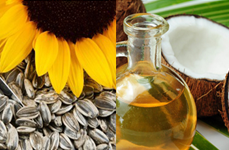Nutrition is an essential part of keeping us healthy long-term, and our eyes and skin are no exception. More than 6.5 million Americans over 65 have eye health concerns, and our population is aging—by 2030, an estimated 71.5 million people will be over age 65. That means there’s greater chance of even more people having concerns with eye health in the future. In addition, in 2017 the American Academy of Dermatology reported that 1 in 4 people experience skin health concerns each year.
All of this adds up to an important truth—we should do everything we can to support our health and make sure we get enough of the nutrients that support specific areas of health, including antioxidant carotenoids like lutein for eye and skin support.
What is Lutein?
Lutein is a nutrient that is classified as a carotenoid pigment. You may be familiar with other carotenoids, like vitamin A (beta-carotene) found in orange produce like carrots, or lycopene found in red produce like tomatoes, watermelon and red peppers. Carotenoids are the pigments that give our produce color, and over 600 carotenoids have been identified in nature.
Each carotenoid provides unique benefits, and some of them have an affinity for certain areas of the body.3 Lutein is particularly beneficial for eye and skin health. These carotenoid nutrients are a big part of why we should aim to eat a variety of colorful produce. Diversifying our intake of real foods gives us nutritional diversity, an important factor in maintaining health and wellbeing.
Lutein is also known as a macular pigment. It is one of two helpful carotenoid pigments that are highly concentrated in the macula, and it is also deposited in the skin. The other macular carotenoid is zeaxanthin, which very similar to lutein in structure and benefit. You’ll often find lutein and zeaxanthin together in the same foods, and they’re also available together in lutein and zeaxanthin tablets and softgels.
How Does Lutein Work?
Lutein's vision benefits result primarily from its ability to help filter harmful blue light, and it provides antioxidant benefits as well. Why is filtering out blue light so important? Blue light rays are shorter and more energetic than any other type of light on the visible color spectrum, so blue light rays are more damaging to our retinas.
Blue light is very close to ultraviolet (UV) light, which is not visible to the human eye. Like UV light, blue light comes naturally from the sun. Electronic devices are also a major source of blue light exposure for most of us. More blue light is emitted from smart phones, tablets, computers, televisions and other electronics than from any other light source, and since the average American adult spends more than 11 hours per day on electronic devices, our exposure levels have increased exponentially compared to previous generations.
Lutein supports skin health in a similar way and in part by providing antioxidant support for healthy skin cells to fight oxidative damage, which is a key contributor to many skin health concerns, including signs of skin aging.
Benefits of Lutein
Lutein is widely known as “the eye vitamin” as the primary area of research for the ingredient has been around eye health. People who consume higher amounts of lutein on a regular basis have fewer eye health concerns, including age-related eye concerns.8 But the antioxidant effects of lutein may extend to many other areas as well, including health and appearance of the skin.
Lutein is a strong antioxidant that shows a beneficial effect against oxidative stress from daily functions and environmental concerns.9 It’s a free radical-scavenging nutrient, and since free radical damage is a major contributor to signs of skin aging and skin health, protecting against free radicals may help keep skin healthy and vibrant.
Also, an exciting new study linked higher lutein levels with a higher IQ, noting that about 60% of the total carotenoids in brain tissue is lutein.11 So, getting your daily dose of lutein may even help make you smarter!
Lutein and Eye Health
We are bombarded with blue light every day — from our digital device screens and the natural light coming through our windows to the light from energy efficient light bulbs. And lutein is an extremely beneficial way to help keep our eyes healthy in the face of so much blue light exposure.
As previously mentioned, the visual benefits of lutein are believed to be tied to lutein’s ability to help filter out those damaging blue light rays before they can cause damage. When we consume lutein, it accumulates in the macula, which is the region of the retina responsible for vision. The macula is also the area of the eye that is most sensitive to blue light exposure.
You may think of it as similar to sunglasses or window tinting, but we recommend you continue to wear your sunglasses because they are your first line of defense while you are outdoors against blue light from the sun and UV damage to your eyes.
In addition to its benefits against blue like exposure, lutein has shown a lot of promise in helping protect our eyes against age-related health concerns, which is demonstrated by fewer occurrences of eye problems among those who consume higher amounts of lutein-containing foods. Lutein has also been linked to night vision benefits, as one study linked lutein to better visual performance at night. Individuals taking lutein supplements for a period of 36 months have also reported improvements in existing symptoms related to eye health, but we recommend starting your eye health support regimen as early as possible to stay ahead of potential eye problems before they start is essential.
Lutein and Skin Health
When it comes to keeping our skin healthy, there’s a lot working against us, but we can help stack the odds in our favor with the right care and nutrition. Just as our eyes are bombarded with blue light, our skin is constantly exposed to the elements—polluted air, solar radiation and plenty of chemicals in our environments and household products may encourage free radicals and skin damage. Psychological and physical stressors also play a role, including nutritional gaps or overeating, alcohol intake, plus our own natural metabolism generates free radicals that can affect the health and appearance of our skin.
Lutein is a big step in the right direction when it comes to skin health. It’s a strong antioxidant, helping to fight off damage from oxidative and environmental stressors. Carotenoids are known to accumulate in the dermis and help play a role in skin protection. Though lutein is often found in much lower levels in the skin than some other carotenoids, it still plays an important role and contributes to a larger nutritional effort to keep skin healthy.
Lutein Dosage: How Much Lutein Do I Need?
According to the American Optometric Association, most Western diets are low in both lutein and zeaxanthin, and the association recommends supplementing your diet with at least 10 mg per day of lutein and 2 mg per day of zeaxanthin to support eye health if your diet is low in these nutrients.
Doses of 6.9 mg to 20 mg of lutein per day has been studied in scientific research, and doses of up to 15 mg per day have been used safely for up to 2 years.16 Due to variations in product formulations, always follow the directions on your product label to determine how much lutein to take.
Just for comparison, a cup of raw kale (one of the richest food sources of lutein and zeaxanthin) contains 22 mg, so the kale-enthusiasts among us are benefiting from added macular carotinoids.16 You can check your own daily intake by reviewing the list of lutein food sources below.
How Can I Get Lutein?
The best way to get lutein in your diet is by eating real foods that contain lutein, which include many dark, leafy greens. Kale contains a higher amount of lutein, while romaine, whole eggs and corn contain smaller amounts.
Since eating a bunch of kale every single day isn’t in the stars for all of us, we can meet our nutritional need for lutein with supplements, like Swanson Ultra Lutein, which includes 20 mg of lutein sourced from marigold flower extract. It’s a simple and cost-effective way to make sure you get your daily dose of lutein. We also offer a 40 mg lutein formula if you are looking for a higher daily dose.
Food Sources of Lutein
Which foods are high in lutein? Here’s a list of selected foods that contain lutein and zeaxanthin.
• Kale (22 mg per 1 cup raw, 44 mg per 1 cup cooked)
• Spinach (6.7 mg per 1 cup raw, 15 mg per 1 cup cooked)
• Turnip greens (9 mg per ½ cup cooked)
• Collard greens (8.7 mg per ½ cup cooked)
• Broccoli (3.3 mg per 1 cup cooked)
• Corn (1.5 mg per ½ cup cooked)
• Romaine lettuce (1.47 mg per 1 cup raw)
• Green peas (1.1 mg per ½ cup)
• Brussels sprouts (1 mg in ½ cup cooked)
• Eggs (0.3 mg in 2 whole eggs)
Lutein Supplements
Help protect yourself from blue light and free radical damage with supplements formulated specifically for eye and skin health. You can choose a supplement with only lutein, or opt for a supplement that contains both lutein and zeaxanthin for multifaceted protection.
• Lutein
Each capsule supplies 6 mg of lutein produced from esters.
• Lutein
Each capsule delivers 40 mg pure lutein and 2 mg zeaxanthin.
You can see Swanson’s full range of supplements for vision health here.
Carotenoids for Vision and Skin Support
The importance of nutrition for healthy eyes and skin shouldn’t be underestimated. Nutrition for these areas are a long game. So, start taking care of your eye and skin health now so you can get ahead of potential age and lifestyle-related concerns and support your long-term health and wellbeing.























LEAVE A COMMENT :
Comments sort : Newest / Oldest / Most Upvoted